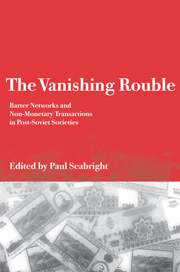Book contents
- Frontmatter
- Contents
- List of figures
- List of tables
- List of boxes
- Preface
- List of contributors
- Introduction: barter networks and ‘information islands’
- I Theory
- II Large-scale empirical studies
- 4 Barter in post-Soviet societies: what does it look like and why does it matter?
- 5 The growth of non-monetary transactions in Russia: causes and effects
- 6 Barter in Russia
- 7 The household in a non-monetary market economy
- 8 Barter in transition economies: competing explanations confront Ukrainian data
- 9 Barter and non-monetary transactions in transition economies: evidence from a cross-country survey
- III Ethnography
- Conclusion: what is to be done?
- Index
4 - Barter in post-Soviet societies: what does it look like and why does it matter?
Published online by Cambridge University Press: 05 May 2010
- Frontmatter
- Contents
- List of figures
- List of tables
- List of boxes
- Preface
- List of contributors
- Introduction: barter networks and ‘information islands’
- I Theory
- II Large-scale empirical studies
- 4 Barter in post-Soviet societies: what does it look like and why does it matter?
- 5 The growth of non-monetary transactions in Russia: causes and effects
- 6 Barter in Russia
- 7 The household in a non-monetary market economy
- 8 Barter in transition economies: competing explanations confront Ukrainian data
- 9 Barter and non-monetary transactions in transition economies: evidence from a cross-country survey
- III Ethnography
- Conclusion: what is to be done?
- Index
Summary
Introduction
What makes the director of a large Russian engineering factory trade machine tools for a mixed consignment of potatoes and consumer goods? And are such business practices an encouraging sign of entrepreneurial adaptation to the new market economy, or a sign that things have gone disturbingly wrong?
Events since the collapse of the Soviet Union at the beginning of the 1990s have brought many surprises, particularly to those who thought that the direction of economic change was predictable even if its speed and the accompanying discomfort were not. Though severe economic disruption, political instability and the re-emergence of nationalism were all widely foreseen, most observers concurred in expecting economic transactions to become more market-based: more transparent, more anonymous, less dependent upon traditional systems of mutual obligation. For example, large enterprises, vertically and horizontally integrated, uniting very diverse productive activities under the same administrative structure, were expected to break up and be replaced by combinations of activity that embodied more natural synergies, and engaged in monetary transactions in the market to a much greater extent than before.
One of the great surprises, noted by some journalists and well known to those who have visited firms in the CIS but so far given attention by comparatively few scholars of the economic transition, has been the existence of barter transactions on a very large scale. These are not just transactions between individuals trading household commodities or personal services with each other (a well known phenomenon under communism).
- Type
- Chapter
- Information
- The Vanishing RoubleBarter Networks and Non-Monetary Transactions in Post-Soviet Societies, pp. 93 - 113Publisher: Cambridge University PressPrint publication year: 2000
- 10
- Cited by



